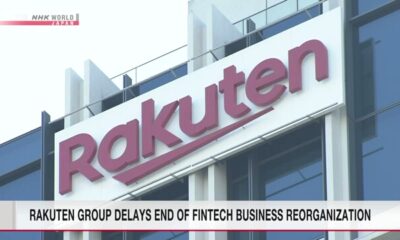Fintech
Will Vietnam’s fintech sector realize its immense potential?

1
From Samantha BarnesInternational Banker
“Vietnam is considered a land of opportunity for the fintech industry mainly due to its young population, high economic growth rate and the increasing adoption of digital devices in the country,” said an official from Woori Financial Group at the launch of its Digital Innovation Lab (DINNOlab) in Hanoi in late April, attended by officials from the Korea Financial Services Commission (FSC), the Central Bank of Vietnam (State Bank of Vietnam, or SBV) and the Embassy of the Republic of Korea in Vietnam. “DINNOlab Vietnam aims to support the partnership of Korean startups[s] with leading fintech companies in Vietnam, aiming to discover new business models.” The simple fact that Vietnam was chosen by this financial services giant, the largest bank in South Korea, as the preferred strategic location for this important bank testing for financial technology (fintech) in Southeast Asia is particularly significant and highlights the rapidly growing attractiveness the country holds as an exciting fintech hub.
With the emergence of a tech-savvy middle class and the steadfast support of a resolutely supportive government, Vietnam is transforming into an attractive destination for fintech investment. According to automated financial services company Robocash, Vietnam’s fintech sector is experiencing the highest growth rate in the ASEAN (Association of Southeast Asian Nations) region after Singapore and is expected to reach a high valuation of $18 billion this year.
A joint report by Google and Temasek also showed that Vietnam had the fastest-growing digital economy in Southeast Asia in 2022, recording a phenomenal annual growth rate of 28%, while research by the Bank of State of Vietnam revealed that the number of fintech companies in the country rose from 39 at the end of 2015 to more than 150 in 2021. A separate report by UOB (United Overseas Bank) in 2022, meanwhile, counted more than 200 companies fintechs operating in Vietnam in various market segments.
It should come as no surprise, then, that in recent years, companies and investors have been clamoring to increase their exposure to Vietnam’s burgeoning fintech space. For example, through its local affiliate JB Securities Vietnam (JBSV), another major Korean financial services provider, JB Financial Group, has partnered with Infina, a leading Vietnamese financial platform focused on wealth management with approximately 1.3 million customers and 500,000 monthly active users. This is a key move under JB Financial’s new growth model, which focuses on strategic investments for mutual growth with domestic and foreign fintech companies.
“We expect that cooperation with a potential Vietnamese fintech company will further help us head in the right business direction,” JBSV Chief Executive Officer Kim Doo-yoon said after signing the deal in Hanoi. His Infina counterpart, James Vuong, added that the cooperation “would set an example of joint prosperity in Vietnam, which has high growth potential.” Vuong, meanwhile, said Infina was pleased to work with “a financial services company that has great customer trust” and that JB Financial Group’s expertise in finance and related digital technology was a crucial factor in the decision to proceed with the partnership. “We expect that JB Financial Group will not only expand operations in Vietnam, but also take us with them as it continues to establish a foothold in other countries.”
Konsentus, a global leader in open banking advisory services and trust infrastructure, has partnered with SAVIS, a leading Vietnamese provider of digital products, services and solutions for key industries such as financial services, government, healthcare and telecommunications, to accelerate the proliferation of open banking in Vietnam. “Our international footprint and in-depth knowledge of global open banking ecosystems have enabled us to streamline processes and develop a framework tailored to the needs of the local Vietnamese market,” said Jim Wadsworth, Executive Vice President of Strategic Market Development at Konsentus. “Vietnam is a booming economy, yet 44% are still unbanked and 70% still live in rural or remote areas. Open banking can support financial inclusion and the broader digital transformation agenda. Konsentus looks forward to supporting Vietnam in its open banking journey.”
“Open banking can foster economic growth and social development. It provides customers with a complete view of all financial data and allows businesses to access a wider range of financial services. Banks work with third-party providers to optimize their “user experience when using financial products and services,” SAVIS Technical Director Van Hoang Nguyen also said. “With [the] In the open banking ecosystem, consumers can make direct payments to merchants from their bank accounts, eliminating the need for paper-based transactions. Konsentus has been a crucial partner in understanding global best practices and defining the appropriate structure for the Vietnamese market. We are confident that what we have achieved together is adapted to the market and will prepare the country for future success.”
The payments sector is the brightest in Vietnam’s fintech ecosystem, with e-wallet facilities and contactless payments riding the wave of the country’s e-commerce boom. And with Statista estimating a massive three-fold increase in mobile wallet users from 24.7 million in 2021 to around 67.6 million in 2026, it’s clear why much of the global funding is pouring into this particular segment. “The steady growth of the digital economy and the rise of e-commerce and cross-border trading platforms underpin the fundamental drivers of Fintech growth in Vietnam, which was dominated by digital payments and consumer lending in 2022,” noted the “Advance of Fintech in Vietnam (2023)” report by professional services firm Acclime Vietnam.
The payments boom has also been strongly supported by Vietnamese authorities, with the central bank signing a memorandum of understanding (MoU) in February to develop its cross-border payment services system in concert with five other ASEAN member countries, seeking to enhance the strength of its regional payment connectivity and improve the convenience, transparency, speed and cost of cross-border transactions. The MoU focuses mainly on cross-border payment connectivity for retail transactions, with quick response (QR) codes and instant payment services featuring prominently.
Indeed, Hanoi has been instrumental in facilitating the growth of Vietnam’s burgeoning fintech sector. In 2021, for example, the government approved a two-year pilot program that allows customers with mobile phone accounts to make payments for low-value transactions for goods and services, money transfers, top-ups, and withdrawals without having to have a bank account, smartphone, or internet connection. It was aimed at remote rural areas to encourage greater financial inclusion and promote a cashless society. Given its successful adoption across the country, the government passed a resolution in November 2023 extending the service until the end of 2024.
Given the launch of Hanoi’s National Digital Transformation Program, which set formal targets for Vietnam’s digital economy of a 25% share of gross domestic product (GDP) by 2025 and a 30% share by 2030 ( significantly above the General Statistics Office share). [GSO’s] estimated for 2022 at 15.41%), the notable growth of the national fintech sector is widely expected. “15% is still considered a high figure because the scale of Hanoi’s economy is large, with a GDP of VND 1.2 quadrillion,” according to Dau Ngoc Hung, head of the Hanoi Statistics Bureau. “In other words, 15.4% is less than 30%, but the absolute value is high.” The Ministry of Information and Communications (MIC) has also set a target to increase the use of Internet Protocol version 6 (IPv6) from 65% to 80% by the end of this year, placing Vietnam among the top eight countries in the world for IPv6. usage.
The government has devised a new regulatory framework for financial technology, with the first ever draft regulatory sandbox issued in 2020. This was followed by the SBV launching in March 2024 a new draft decree for a Regulatory sandbox for the Vietnamese banking sector, which proposes a comprehensive financial technology sandbox program framework that would include eligible solutions, eligibility criteria for service providers and requirements for participation.
That said, however, challenges remain in realizing these lofty ambitions, not least the sobering plunge in recent investment in Vietnamese fintech companies: an 84% decline from $227 million in 2022 to $35.3 million in just eight funding rounds in 2023, according to data from tech-focused investment platform Tracxn. The funding slowdown has largely been attributed to a lack of late-stage funding rounds, as well as the emergence of neither a single $100 million round nor a unicorn during the year.
However, a more optimistic 2024 and beyond is widely expected for Vietnam’s fintech sector. “Vietnam’s fintech market is expected to grow at a higher pace in the coming years. Its growing tech-savvy young population and digitalization are expected to accelerate growth in this region,” Tracxn said in a press release. The report also highlighted key takeaways amid the gloom of 2023, including alternative lending, which saw a 50 percent increase in total funding from $11.4 million raised in 2022 to $17.1 million in 2023.
A report by Mordor Intelligence also predicted a stellar growth for Vietnam’s fintech market in terms of transaction value from $16.62 billion in 2024 to $41.76 billion by 2029, with a compound annual growth rate (CAGR) of 20.23% during the forecast period. “Vietnam is one of the most promising and untapped fintech markets, with a rapidly growing market for technology companies that support digital banking, digital payments, blockchain, and crypto,” the report noted. “Fintech startups and traditional banks are investing in digital banking solutions to provide customers with seamless and personalized banking experiences. Digital banks such as Timo, Toss, and M Service’s eMonkey have gained traction by providing innovative features and intuitive interfaces.”
Fintech
US Agencies Request Information on Bank-Fintech Dealings

Federal banking regulators have issued a statement reminding banks of the potential risks associated with third-party arrangements to provide bank deposit products and services.
The agencies support responsible innovation and banks that engage in these arrangements in a safe and fair manner and in compliance with applicable law. While these arrangements may offer benefits, supervisory experience has identified a number of safety and soundness, compliance, and consumer concerns with the management of these arrangements. The statement details potential risks and provides examples of effective risk management practices for these arrangements. Additionally, the statement reminds banks of existing legal requirements, guidance, and related resources and provides insights that the agencies have gained through their oversight. The statement does not establish new supervisory expectations.
Separately, the agencies requested additional information on a broad range of arrangements between banks and fintechs, including for deposit, payment, and lending products and services. The agencies are seeking input on the nature and implications of arrangements between banks and fintechs and effective risk management practices.
The agencies are considering whether to take additional steps to ensure that banks effectively manage the risks associated with these different types of arrangements.
SUBSCRIBE TO THE NEWSLETTER
And get exclusive articles on the stock markets
Fintech
What changes in financial regulation have impacted the development of financial technology?

Exploring the complex landscape of global financial regulation, we gather insights from leading fintech leaders, including CEOs and finance experts. From the game-changing impact of PSD2 to the significant role of GDPR in data security, explore the four key regulatory changes that have reshaped fintech development, answering the question: “What changes in financial regulation have impacted fintech development?”
- PSD2 revolutionizes access to financial technology
- GDPR Improves Fintech Data Privacy
- Regulatory Sandboxes Drive Fintech Innovation
- GDPR Impacts Fintech Data Security
PSD2 revolutionizes access to financial technology
When it comes to regulatory impact on fintech development, nothing comes close to PSD2. This EU regulation has created a new level playing field for market players of all sizes, from fintech startups to established banks. It has had a ripple effect on other markets around the world, inspiring similar regulatory frameworks and driving global innovation in fintech.
The Payment Services Directive (PSD2), the EU law in force since 2018, has revolutionized the fintech industry by requiring banks to provide third-party payment providers (TPPs) with access to payment services and customer account information via open APIs. This has democratized access to financial data, fostering the development of personalized financial instruments and seamless payment solutions. Advanced security measures such as Strong Customer Authentication (SCA) have increased consumer trust, pushing both fintech companies and traditional banks to innovate and collaborate more effectively, resulting in a dynamic and consumer-friendly financial ecosystem.
The impact of PSD2 has extended beyond the EU, inspiring similar regulations around the world. Countries such as the UK, Australia and Canada have launched their own open banking initiatives, spurred by the benefits seen in the EU. PSD2 has highlighted the benefits of open banking, also prompting US financial institutions and fintech companies to explore similar initiatives voluntarily.
This has led to a global wave of fintech innovation, with financial institutions and fintech companies offering more integrated, personalized and secure services. The EU’s leadership in open banking through PSD2 has set a global standard, promoting regulatory harmonization and fostering an interconnected and innovative global financial ecosystem.
Looking ahead, the EU’s PSD3 proposals and Financial Data Access (FIDA) regulations promise to further advance open banking. PSD3 aims to refine and build on PSD2, with a focus on improving transaction security, fraud prevention, and integration between banks and TPPs. FIDA will expand data sharing beyond payment accounts to include areas such as insurance and investments, paving the way for more comprehensive financial products and services.
These developments are set to further enhance connectivity, efficiency and innovation in financial services, cementing open banking as a key component of the global financial infrastructure.
General Manager, Technology and Product Consultant Fintech, Insurtech, Miquido
GDPR Improves Fintech Data Privacy
Privacy and data protection have been taken to another level by the General Data Protection Regulation (GDPR), forcing fintech companies to tighten their data management. In compliance with the GDPR, organizations must ensure that personal data is processed fairly, transparently, and securely.
This has led to increased innovation in fintech towards technologies such as encryption and anonymization for data protection. GDPR was described as a top priority in the data protection strategies of 92% of US-based companies surveyed by PwC.
Financial Expert, Sterlinx Global
Regulatory Sandboxes Drive Fintech Innovation
Since the UK’s Financial Conduct Authority (FCA) pioneered sandbox regulatory frameworks in 2016 to enable fintech startups to explore new products and services, similar frameworks have been introduced in other countries.
This has reduced the “crippling effect on innovation” caused by a “one size fits all” regulatory approach, which would also require machines to be built to complete regulatory compliance before any testing. Successful applications within sandboxes give regulators the confidence to move forward and address gaps in laws, regulations, or supervisory approaches. This has led to widespread adoption of new technologies and business models and helped channel private sector dynamism, while keeping consumers protected and imposing appropriate regulatory requirements.
Co-founder, UK Linkology
GDPR Impacts Fintech Data Security
A big change in financial regulations that has had a real impact on fintech is the 2018 EU General Data Protection Regulation (GDPR). I have seen how GDPR has pushed us to focus more on user privacy and data security.
GDPR means we have to handle personal data much more carefully. At Leverage, we have had to step up our game to meet these new rules. We have improved our data encryption and started doing regular security audits. It was a little tricky at first, but it has made our systems much more secure.
For example, we’ve added features that give users more control over their data, like simple consent tools and clear privacy notices. These changes have helped us comply with GDPR and made our customers feel more confident in how we handle their information.
I believe that GDPR has made fintech companies, including us at Leverage, more transparent and secure. It has helped build trust with our users, showing them that we take data protection seriously.
CEO & Co-Founder, Leverage Planning
Related Articles
Fintech
M2P Fintech About to Raise $80M

Application Programming Interface (API) Infrastructure Platform M2P Financial Technology has reached the final round to raise $80 million, at a valuation of $900 million.
Specifically, M2P Fintech, formerly known as Yap, is closing a new funding round involving new and existing investors, according to entrackr.com. The India-based company, which last raised funding two and a half years ago, previously secured $56 million in a round led by Insight Partners, earning a post-money valuation of $650 million.
A source indicated that M2P Fintech is ready to raise $80 million in this new funding round, led by a new investor. Existing backers, including Insight Partners, are also expected to participate. The new funding is expected to go toward enhancing the company’s technology infrastructure and driving growth in domestic and international markets.
What does M2P Fintech do?
M2P Fintech’s API platform enables businesses to provide branded financial services through partnerships with fintech companies while maintaining regulatory compliance. In addition to its operations in India, the company is active in Nepal, UAE, Australia, New Zealand, Philippines, Bahrain, Egypt, and many other countries.
Another source revealed that M2P Fintech’s valuation in this funding round is expected to be between USD 880 million and USD 900 million (post-money). The company has reportedly received a term sheet and the deal is expected to be publicly announced soon. The Tiger Global-backed company has acquired six companies to date, including Goals101, Syntizen, and BSG ITSOFT, to enhance its service offerings.
According to TheKredible, Beenext is the company’s largest shareholder with over 13% ownership, while the co-founders collectively own 34% of the company. Although M2P Fintech has yet to release its FY24 financials, it has reported a significant increase in operating revenue. However, this growth has also been accompanied by a substantial increase in losses.
Fintech
Scottish financial technology firm Aveni secures £11m to expand AI offering

By Gloria Methri
Today
- To come
- Aveni Assistance
- Aveni Detection
Artificial intelligence Financial Technology Aveni has announced one of the largest Series A investments in a Scottish company this year, amounting to £11 million. The investment is led by Puma Private Equity with participation from Par Equity, Lloyds Banking Group and Nationwide.
Aveni combines AI expertise with extensive financial services experience to create large language models (LLMs) and AI products designed specifically for the financial services industry. It is trusted by some of the UK’s leading financial services firms. It has seen significant business growth over the past two years through its conformity and productivity solutions, Aveni Detect and Aveni Assist.
This investment will enable Aveni to build on the success of its existing products, further consolidate its presence in the sector and introduce advanced technologies through FinLLM, a large-scale language model specifically for financial services.
FinLLM is being developed in partnership with new investors Lloyds Banking Group and Nationwide. It is a large, industry-aligned language model that aims to set the standard for transparent, responsible and ethical adoption of generative AI in UK financial services.
Following the investment, the team developing the FinLLM will be based at the Edinburgh Futures Institute, in a state-of-the-art facility.
Joseph Twigg, CEO of Aveniexplained, “The financial services industry doesn’t need AI models that can quote Shakespeare; it needs AI models that deliver transparency, trust, and most importantly, fairness. The way to achieve this is to develop small, highly tuned language models, trained on financial services data, and reviewed by financial services experts for specific financial services use cases. Generative AI is the most significant technological evolution of our generation, and we are in the early stages of adoption. This represents a significant opportunity for Aveni and our partners. The goal with FinLLM is to set a new standard for the controlled, responsible, and ethical adoption of generative AI, outperforming all other generic models in our select financial services use cases.”
Previous Article
Network International and Biz2X Sign Partnership for SME Financing
IBSi Daily News Analysis

SMBs Leverage Cloud to Gain Competitive Advantage, Study Shows
IBSi FinTech Magazine

- The Most Trusted FinTech Magazine Since 1991
- Digital monthly issue
- Over 60 pages of research, analysis, interviews, opinions and rankings
- Global coverage
subscribe now
-

 DeFi12 months ago
DeFi12 months agoDeFi Technologies Appoints Andrew Forson to Board of Directors
-

 Fintech12 months ago
Fintech12 months agoUS Agencies Request Information on Bank-Fintech Dealings
-

 News1 year ago
News1 year agoBlock Investors Need More to Assess Crypto Unit’s Earnings Potential, Analysts Say — TradingView News
-

 DeFi12 months ago
DeFi12 months agoSwitchboard Revolutionizes DeFi with New Oracle Aggregator
-

 DeFi12 months ago
DeFi12 months agoIs Zypto Wallet a Reliable Choice for DeFi Users?
-

 News1 year ago
News1 year agoBitcoin and Technology Correlation Collapses Due to Excess Supply
-

 Fintech12 months ago
Fintech12 months agoWhat changes in financial regulation have impacted the development of financial technology?
-

 Fintech12 months ago
Fintech12 months agoScottish financial technology firm Aveni secures £11m to expand AI offering
-

 Fintech12 months ago
Fintech12 months agoScottish financial technology firm Aveni raises £11m to develop custom AI model for financial services
-

 News1 year ago
News1 year agoValueZone launches new tools to maximize earnings during the ongoing crypto summer
-

 Videos6 months ago
Videos6 months ago“Artificial intelligence is bringing us to a future that we may not survive” – Sco to Whitney Webb’s Waorting!
-

 DeFi1 year ago
DeFi1 year agoTON Network Surpasses $200M TVL, Boosted by Open League and DeFi Growth ⋆ ZyCrypto
















